
Acianthus, commonly known as mosquito orchids, is a genus of about twelve species of plants in the orchid family, Orchidaceae. Mosquito orchids are terrestrial herbs with a single, heart-shaped, usually ground-hugging leaf and one to many small, green, pinkish or purplish flowers on a fleshy stalk. They are found in New Caledonia, Australia and New Zealand.

Pterostylis curta, commonly known as the blunt greenhood, is a species of orchid found in south-eastern Australia, Lord Howe Island and New Caledonia. It has a rosette of leaves at its base and a single white and green, forward leaning flower with a brown tip and a twisted labellum.

Pterostylis grandiflora, commonly known as the cobra greenhood or superb greenhood, is a species of orchid endemic to south-eastern Australia. As with similar orchids, the flowering plants differ from those which are not flowering. The non-flowering plants have a rosette of leaves but the flowering plants lack a rosette and have a single flower with leaves on the flowering spike. This greenhood has a green and white, striped flower with deep red-brown markings especially on its "galea", and a sharply pointed dorsal sepal.

Acianthus fornicatus, commonly known as bristly mosquito orchid or pixie caps, is a species of flowering plant in the orchid family Orchidaceae and is endemic to eastern Australia. It is a terrestrial herb with a single, heart-shaped leaf and up to ten translucent pinkish-red flowers, and is widespread and common in coastal and near-coastal areas.

Cyrtostylis reniformis, commonly known as common gnat-orchid, is a species of orchid endemic to eastern Australia. It usually has a single kidney-shaped leaf and a flowering spike with up to eight reddish flowers with a shelf-like labellum.
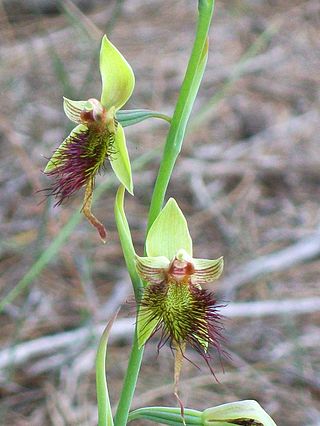
Calochilus paludosus, commonly known as the red beard orchid or red beardie, is a species of orchid native to Australia and New Zealand. It has a single fleshy, light green leaf and up to nine greenish flowers with reddish stripes. The labellum has a dull red or coppery coloured beard and lacks the "eye" spots of other beard orchids.

Genoplesium fimbriatum, commonly known as the fringed midge orchid is a small terrestrial orchid found from southern Queensland to southern New South Wales. It has a single thin leaf and up to thirty green to brownish-green flowers with red stripes and a red-tipped labellum with hairy edges.

Acianthus collinus, commonly known as hooded mosquito orchid or inland mosquito orchid, is a species of flowering plant in the orchid family Orchidaceae and is endemic to south-eastern continental Australia. It is a terrestrial herb with a single, heart-shaped leaf and between two and nine translucent pinkish flowers with reddish markings and is found growing in colonies on sheltered slopes in open forest in on the western slopes of the Great Dividing Range.
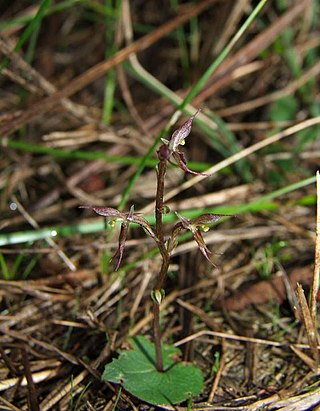
Acianthus pusillus, commonly known as small mosquito orchid, is a species of flowering plant in the orchid family Orchidaceae and is endemic to eastern Australia. It is a terrestrial herb with a single, heart-shaped leaf and up to 18 small, translucent green or pinkish flowers with reddish marking and a green to reddish-purple labellum. It is widely distributed, growing in moist places from central-eastern Queensland, south through New South Wales and Victoria to South Australia and Tasmania.
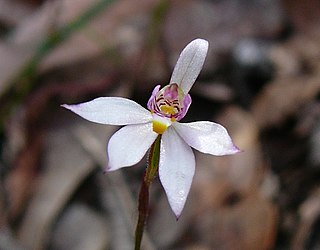
Caladenia alata, commonly known as the fairy orchid, is a plant in the orchid family Orchidaceae and is found in south-eastern Australia and New Zealand. It is a ground orchid with small, usually short-lived flowers, which have relatively stiffly held petals and sepals and reddish-purple bars on the labellum.
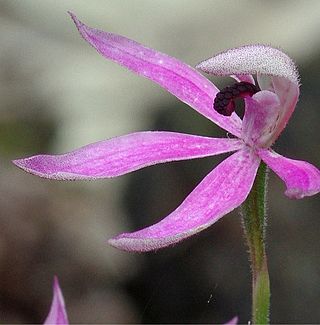
Caladenia congesta, commonly known as black-tongue caladenia, is a plant in the orchid family Orchidaceae and is endemic to Australia. It is a ground orchid with a single, sparsely hairy leaf, and up to three bright pink flowers with the central part of the labellum completely covered with black calli. It is a widespread species but not common in any part of its range.

Caladenia filamentosa, commonly known as daddy-long-legs, is a plant in the orchid family Orchidaceae and is endemic to eastern Australia. It is a ground orchid with a single hairy leaf and up to four, usually dark red flowers with long, drooping lateral sepals and petals.

Pterostylis obtusa, commonly known as the blunt-tongue greenhood, is a species of orchid endemic to New South Wales. It is distinguished from similar greenhood orchids by its thick, flat, platform-like sinus and blunt labellum which is only just visible above the sinus.

Pterostylis concinna, commonly known as the trim greenhood, is a species of orchid endemic to south-eastern Australia and which usually grows in colonies. It has a rosette of leaves at the base and a single dark green, white and orange-red flower.

Diuris alba, commonly called the white donkey orchid, is a species of orchid which is endemic to eastern Australia. It has up to three leaves, and a flowering stem with up to seven white flowers with purplish markings.

Acianthus caudatus, commonly known as mayfly orchid, is a species of flowering plant in the orchid family Orchidaceae and is endemic to eastern Australia. It is a terrestrial herb with a single egg-shaped or heart-shaped leaf and up to nine dark purplish flowers with thin, spreading sepals and petals, often with a musty odour.

Prasophyllum patens, commonly known as the broad-lipped leek orchid or sandstone leek orchid, is a species of orchid endemic to the Sydney region of New South Wales. It has a single tubular green leaf and up to thirty green to greenish-brown, lemon-scented flowers with a white labellum.
Microtis rara, commonly known as the scented onion orchid, is a species of orchid endemic to Australia, with the exception of the Northern Territory. It has a single hollow, onion-like leaf and up to fifty small green or yellowish-green, scented flowers. It is similar to Microtis oblonga and some authorities regard the two as being one species.

Corybas fimbriatus, commonly known as the fringed helmet orchid, is a species of terrestrial orchid endemic to eastern Australia. It has a broad egg-shaped to round leaf and a dark reddish purple to crimson flower with translucent patches. It is similar to C. hispidus but its labellum lacks a creamy-white centre and is not covered with bristly hairs.
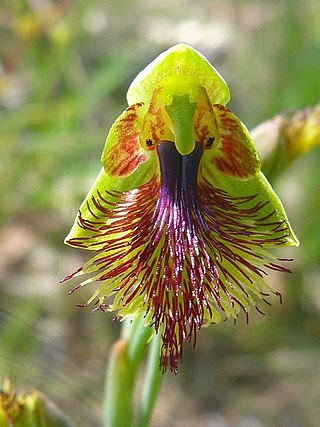
Calochilus campestris, commonly known as the copper beard orchid, is a species of orchid endemic to south-eastern Australia. It has a single fleshy, channelled leaf and up to fifteen pale green and red flowers with a purple "beard".



















